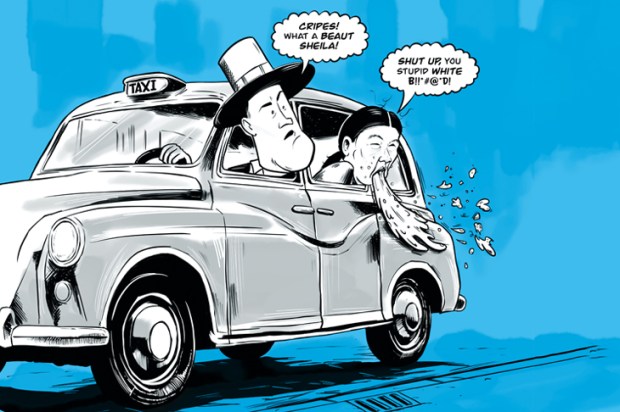It goes without saying that when one of our most popular columnists, Peter Coleman, instructs his band of loyal readers to check out a certain speech on a certain website, that is precisely what we do. Thus, to our delight, we were able to mull over the speech by Kelly O’Dwyer, Tony Abbott’s recently reshuffled addition to his economics team, delivered at the Centre for Independent Studies. As we have complained on numerous occasions, the obligation on the part of the Coalition to explain its fiscal measures (to ‘sell’ them to the electorate) in a compelling narrative has eluded it for many years. No longer.
In tackling the concept of ‘fair’ head on, Ms O’Dwyer succeeds where others have feared to tread – by showing up Labor’s reliance upon this cunning four-letter F word for the fraudulent and mendacious device it is.
‘I have a very deep concern that fairness is being hijacked as a one-word slogan by Labor and the Greens to encapsulate a very narrow concept,’ Ms O’Dwyer says. ‘Their aim is to set a Boolean test – whether a budget measure takes more from those with higher incomes than they enjoyed prior to the budget and/or gives more to those with lower incomes than they enjoyed prior to the budget.’ (Note to Ms O’Dwyer – perhaps on her next Q&A outing ‘Boolean’ might be replaced with a slightly less esoteric term).
Ms O’Dwyer neatly illustrates that the concept of ‘fairness’ is not only multi-dimensional, but our emotive response to it varies dramatically when new factors are brought into play. She deploys ‘a hypothetical example of David, who finds himself fighting for his life in the face of a cancer diagnosis. Do you think it’s fair that he has to bear [the] costs? Or do you think it’s only fair for the Australian taxpayer to? Does your attitude change if you learn that David has been paying tax and the Medicare Levy at the top rate… for 20 years and never once turned to the public healthcare system? What if you learn that he inherited a $5 million estate last year? Does it change if you learn that David was a middle-income earner who chose not to take out private health insurance … because he was squirrelling savings away for this first home or paying for his children’s education at an independent school? What if it’s because he habitually travels first class overseas to stay in a five-star resort on his annual holiday? What if you learn that it’s skin cancer and David refused to wear sunscreen? Does it change if you learn that David is a five year old child?’
Ms O’Dwyer examines fairness in public finances through ‘Intergenerational fairness’, ‘Hidden winners and losers’, ‘Personal responsibility’, ‘Reward for effort’ and ‘Transitional fairness’ – namely, how ‘fair’ is it to alter specific policy settings that have determined people’s financial decision-making for years? This is a debate the Coalition cannot avoid, and indeed, must win. It’s a powerful story, particularly compared to Labor’s trite ‘goodies and baddies’ fairness fairytales.
Pop quiz
Our heart-felt sympathies go to our former colleague Chris Bowen, who gave up the admirable and much sought after job of being a regular Speccie columnist in order to pursue the far less enviable task of being federal shadow treasurer. As with any writer, Mr Bowen has taken his lateral thinking, his creativity and his craftsmanship with words and put them to good use in his new job. We were particularly impressed by his recent descriptions of the billion or so dollars treasury borrows each month to service our debt, still dangling with Damoclean precision over the nation from the Wayne Swan years, as a matter of mere ‘rhetoric’. Oddly, we struggled in vain to find this lofty financial term in any thesaurus, even though we specifically searched under all the relevant phrases: ‘crippling debt’, ‘national disgrace’, ‘intergenerational theft’ and ‘highway robbery.’ Perhaps the Macquarie Dictionary may now feel inclined to replace the archaic term ‘deficit’ with the far more pleasing word ‘rhetoric’ in its next edition.
Meanwhile, Mr Bowen also provided us with a novel turn of phrase to describe the process whereby a well-respected journalist with impeccable financial credentials asks the nation’s likely next treasurer on a live TV show to inform the audience what the current tax thresholds are. Unable to do so, Mr Bowen cleverly side-stepped his interrogator by dismissing such impertinent and irrelevant questioning as a ‘pop quiz’. Perhaps Mr Bowen would have felt more comfortable, like his illustrious predecessor, taking questions on Bruce Springsteen.
Got something to add? Join the discussion and comment below.
Get 10 issues for just $10
Subscribe to The Spectator Australia today for the next 10 magazine issues, plus full online access, for just $10.
You might disagree with half of it, but you’ll enjoy reading all of it. Try your first month for free, then just $2 a week for the remainder of your first year.














Comments
Don't miss out
Join the conversation with other Spectator Australia readers. Subscribe to leave a comment.
SUBSCRIBEAlready a subscriber? Log in